Ethical Dilemma in Nursing Students Case Study 2022
VerifiedAdded on 2022/09/22
|9
|3671
|49
AI Summary
Contribute Materials
Your contribution can guide someone’s learning journey. Share your
documents today.
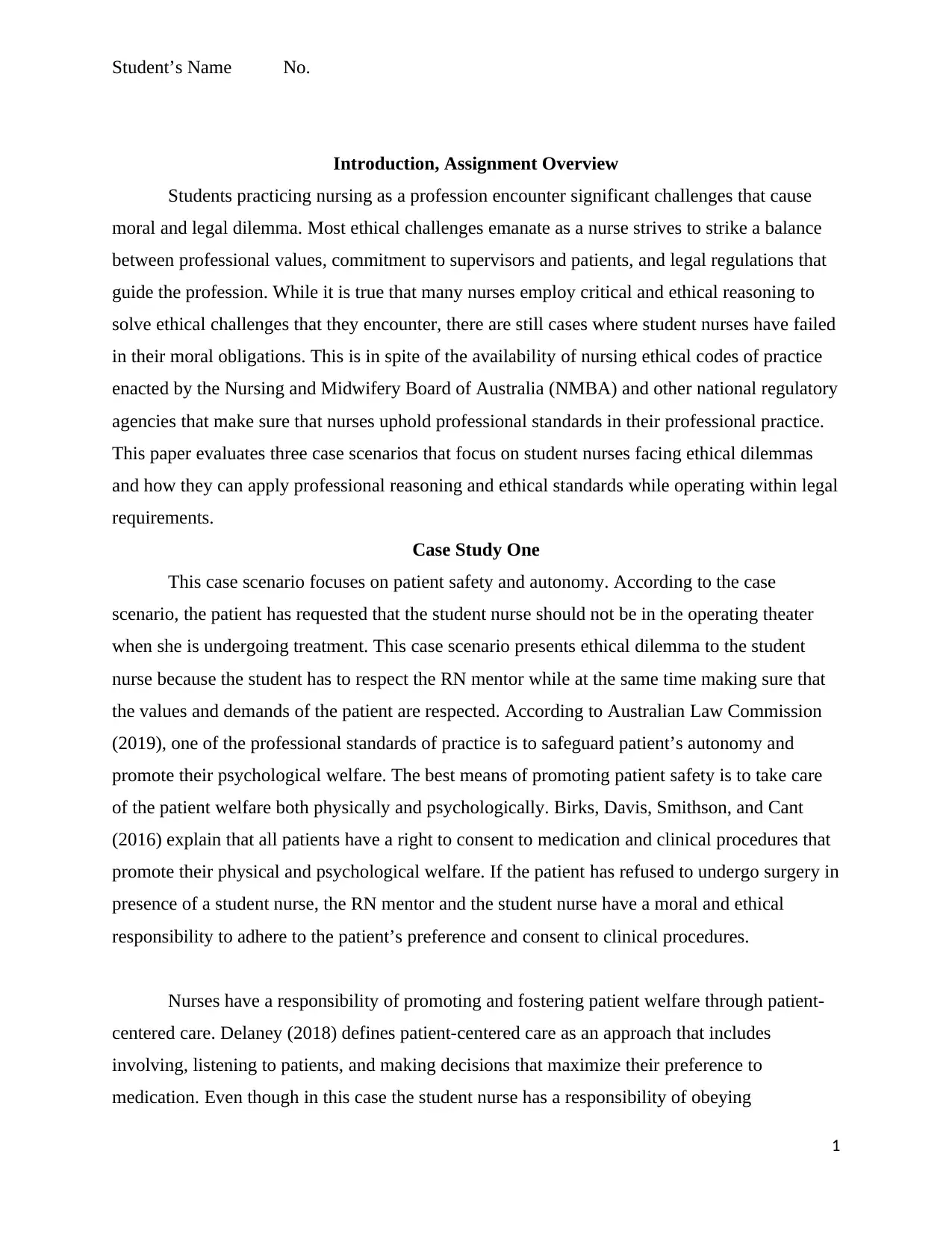
Student’s Name No.
Introduction, Assignment Overview
Students practicing nursing as a profession encounter significant challenges that cause
moral and legal dilemma. Most ethical challenges emanate as a nurse strives to strike a balance
between professional values, commitment to supervisors and patients, and legal regulations that
guide the profession. While it is true that many nurses employ critical and ethical reasoning to
solve ethical challenges that they encounter, there are still cases where student nurses have failed
in their moral obligations. This is in spite of the availability of nursing ethical codes of practice
enacted by the Nursing and Midwifery Board of Australia (NMBA) and other national regulatory
agencies that make sure that nurses uphold professional standards in their professional practice.
This paper evaluates three case scenarios that focus on student nurses facing ethical dilemmas
and how they can apply professional reasoning and ethical standards while operating within legal
requirements.
Case Study One
This case scenario focuses on patient safety and autonomy. According to the case
scenario, the patient has requested that the student nurse should not be in the operating theater
when she is undergoing treatment. This case scenario presents ethical dilemma to the student
nurse because the student has to respect the RN mentor while at the same time making sure that
the values and demands of the patient are respected. According to Australian Law Commission
(2019), one of the professional standards of practice is to safeguard patient’s autonomy and
promote their psychological welfare. The best means of promoting patient safety is to take care
of the patient welfare both physically and psychologically. Birks, Davis, Smithson, and Cant
(2016) explain that all patients have a right to consent to medication and clinical procedures that
promote their physical and psychological welfare. If the patient has refused to undergo surgery in
presence of a student nurse, the RN mentor and the student nurse have a moral and ethical
responsibility to adhere to the patient’s preference and consent to clinical procedures.
Nurses have a responsibility of promoting and fostering patient welfare through patient-
centered care. Delaney (2018) defines patient-centered care as an approach that includes
involving, listening to patients, and making decisions that maximize their preference to
medication. Even though in this case the student nurse has a responsibility of obeying
1
Introduction, Assignment Overview
Students practicing nursing as a profession encounter significant challenges that cause
moral and legal dilemma. Most ethical challenges emanate as a nurse strives to strike a balance
between professional values, commitment to supervisors and patients, and legal regulations that
guide the profession. While it is true that many nurses employ critical and ethical reasoning to
solve ethical challenges that they encounter, there are still cases where student nurses have failed
in their moral obligations. This is in spite of the availability of nursing ethical codes of practice
enacted by the Nursing and Midwifery Board of Australia (NMBA) and other national regulatory
agencies that make sure that nurses uphold professional standards in their professional practice.
This paper evaluates three case scenarios that focus on student nurses facing ethical dilemmas
and how they can apply professional reasoning and ethical standards while operating within legal
requirements.
Case Study One
This case scenario focuses on patient safety and autonomy. According to the case
scenario, the patient has requested that the student nurse should not be in the operating theater
when she is undergoing treatment. This case scenario presents ethical dilemma to the student
nurse because the student has to respect the RN mentor while at the same time making sure that
the values and demands of the patient are respected. According to Australian Law Commission
(2019), one of the professional standards of practice is to safeguard patient’s autonomy and
promote their psychological welfare. The best means of promoting patient safety is to take care
of the patient welfare both physically and psychologically. Birks, Davis, Smithson, and Cant
(2016) explain that all patients have a right to consent to medication and clinical procedures that
promote their physical and psychological welfare. If the patient has refused to undergo surgery in
presence of a student nurse, the RN mentor and the student nurse have a moral and ethical
responsibility to adhere to the patient’s preference and consent to clinical procedures.
Nurses have a responsibility of promoting and fostering patient welfare through patient-
centered care. Delaney (2018) defines patient-centered care as an approach that includes
involving, listening to patients, and making decisions that maximize their preference to
medication. Even though in this case the student nurse has a responsibility of obeying
1
Secure Best Marks with AI Grader
Need help grading? Try our AI Grader for instant feedback on your assignments.
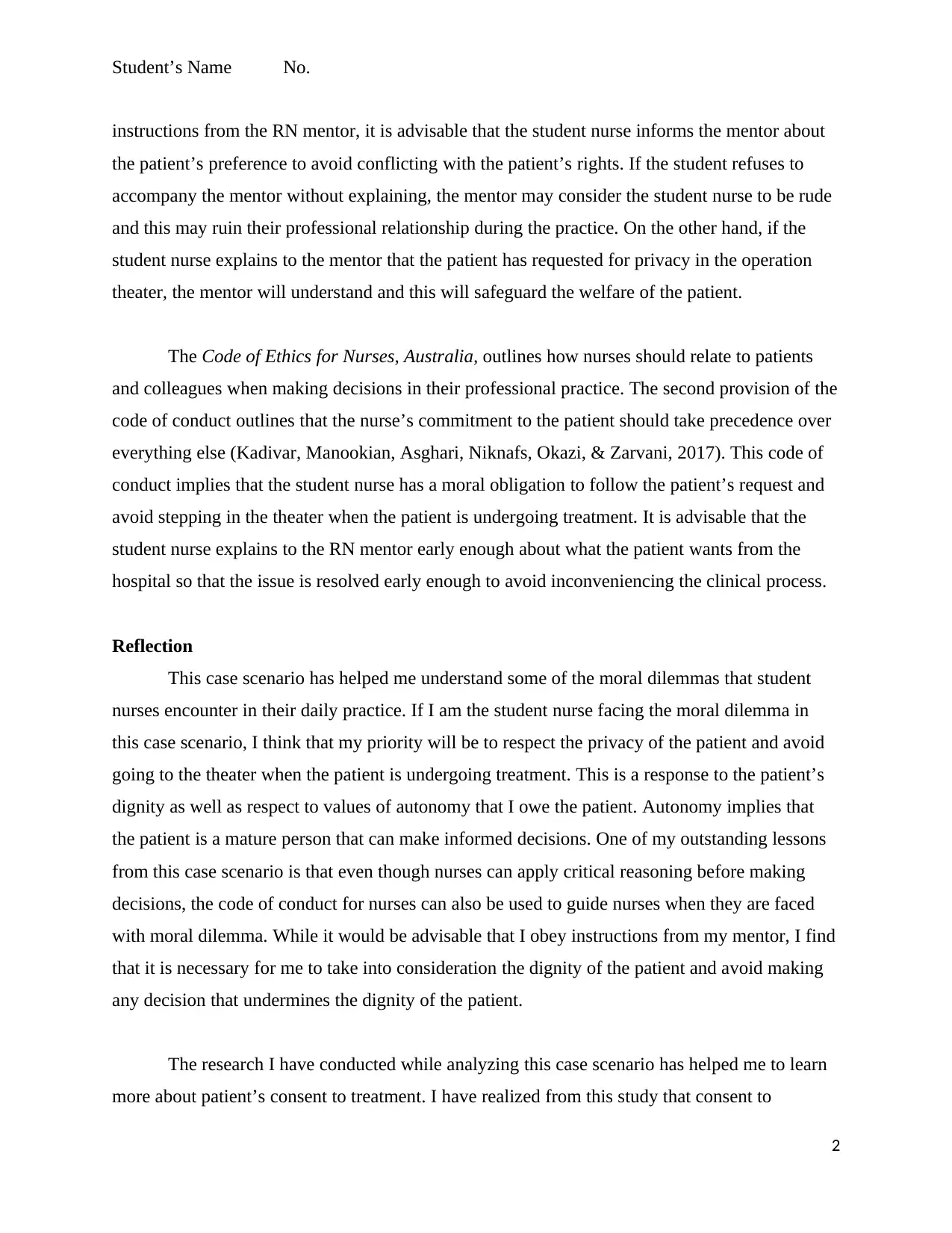
Student’s Name No.
instructions from the RN mentor, it is advisable that the student nurse informs the mentor about
the patient’s preference to avoid conflicting with the patient’s rights. If the student refuses to
accompany the mentor without explaining, the mentor may consider the student nurse to be rude
and this may ruin their professional relationship during the practice. On the other hand, if the
student nurse explains to the mentor that the patient has requested for privacy in the operation
theater, the mentor will understand and this will safeguard the welfare of the patient.
The Code of Ethics for Nurses, Australia, outlines how nurses should relate to patients
and colleagues when making decisions in their professional practice. The second provision of the
code of conduct outlines that the nurse’s commitment to the patient should take precedence over
everything else (Kadivar, Manookian, Asghari, Niknafs, Okazi, & Zarvani, 2017). This code of
conduct implies that the student nurse has a moral obligation to follow the patient’s request and
avoid stepping in the theater when the patient is undergoing treatment. It is advisable that the
student nurse explains to the RN mentor early enough about what the patient wants from the
hospital so that the issue is resolved early enough to avoid inconveniencing the clinical process.
Reflection
This case scenario has helped me understand some of the moral dilemmas that student
nurses encounter in their daily practice. If I am the student nurse facing the moral dilemma in
this case scenario, I think that my priority will be to respect the privacy of the patient and avoid
going to the theater when the patient is undergoing treatment. This is a response to the patient’s
dignity as well as respect to values of autonomy that I owe the patient. Autonomy implies that
the patient is a mature person that can make informed decisions. One of my outstanding lessons
from this case scenario is that even though nurses can apply critical reasoning before making
decisions, the code of conduct for nurses can also be used to guide nurses when they are faced
with moral dilemma. While it would be advisable that I obey instructions from my mentor, I find
that it is necessary for me to take into consideration the dignity of the patient and avoid making
any decision that undermines the dignity of the patient.
The research I have conducted while analyzing this case scenario has helped me to learn
more about patient’s consent to treatment. I have realized from this study that consent to
2
instructions from the RN mentor, it is advisable that the student nurse informs the mentor about
the patient’s preference to avoid conflicting with the patient’s rights. If the student refuses to
accompany the mentor without explaining, the mentor may consider the student nurse to be rude
and this may ruin their professional relationship during the practice. On the other hand, if the
student nurse explains to the mentor that the patient has requested for privacy in the operation
theater, the mentor will understand and this will safeguard the welfare of the patient.
The Code of Ethics for Nurses, Australia, outlines how nurses should relate to patients
and colleagues when making decisions in their professional practice. The second provision of the
code of conduct outlines that the nurse’s commitment to the patient should take precedence over
everything else (Kadivar, Manookian, Asghari, Niknafs, Okazi, & Zarvani, 2017). This code of
conduct implies that the student nurse has a moral obligation to follow the patient’s request and
avoid stepping in the theater when the patient is undergoing treatment. It is advisable that the
student nurse explains to the RN mentor early enough about what the patient wants from the
hospital so that the issue is resolved early enough to avoid inconveniencing the clinical process.
Reflection
This case scenario has helped me understand some of the moral dilemmas that student
nurses encounter in their daily practice. If I am the student nurse facing the moral dilemma in
this case scenario, I think that my priority will be to respect the privacy of the patient and avoid
going to the theater when the patient is undergoing treatment. This is a response to the patient’s
dignity as well as respect to values of autonomy that I owe the patient. Autonomy implies that
the patient is a mature person that can make informed decisions. One of my outstanding lessons
from this case scenario is that even though nurses can apply critical reasoning before making
decisions, the code of conduct for nurses can also be used to guide nurses when they are faced
with moral dilemma. While it would be advisable that I obey instructions from my mentor, I find
that it is necessary for me to take into consideration the dignity of the patient and avoid making
any decision that undermines the dignity of the patient.
The research I have conducted while analyzing this case scenario has helped me to learn
more about patient’s consent to treatment. I have realized from this study that consent to
2
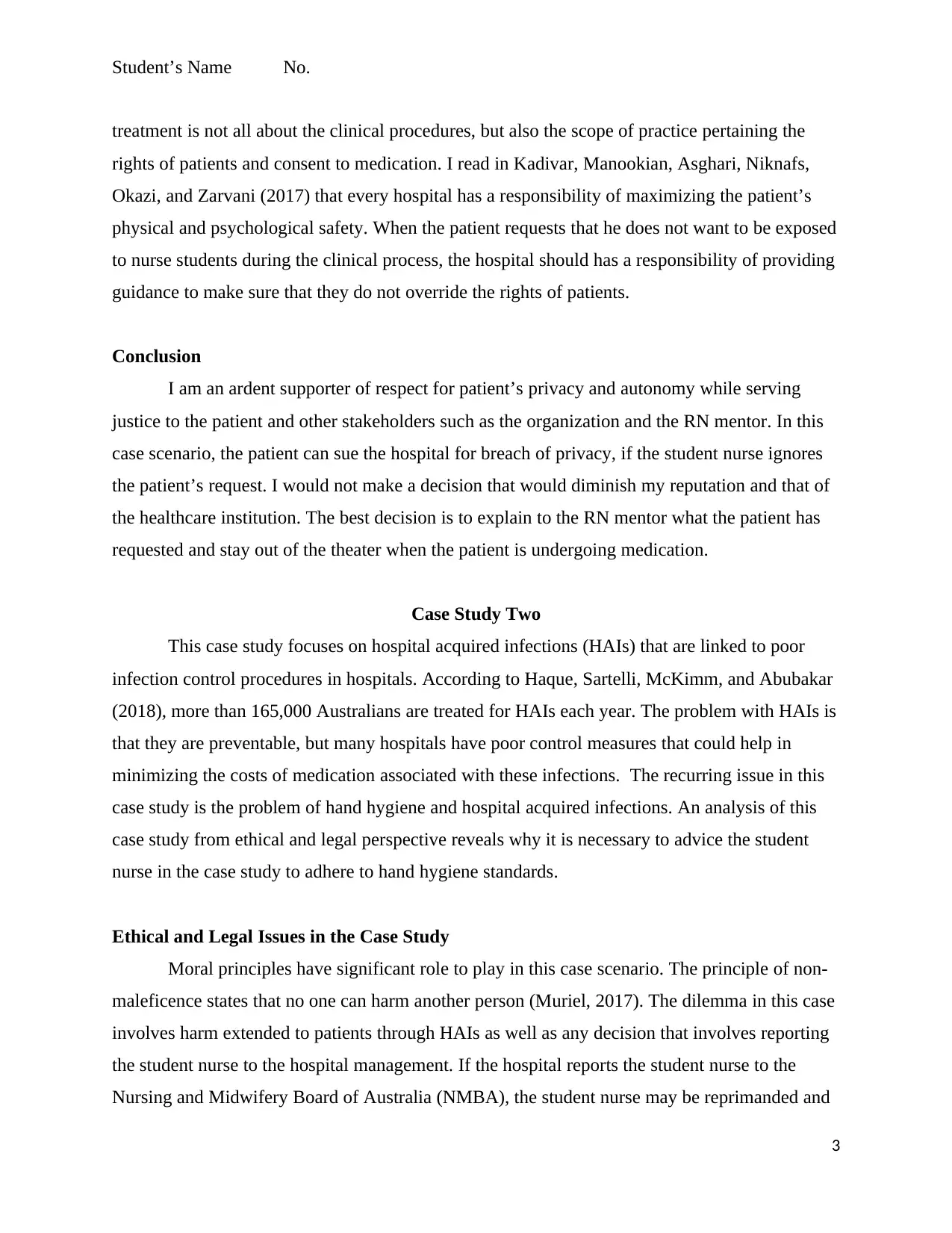
Student’s Name No.
treatment is not all about the clinical procedures, but also the scope of practice pertaining the
rights of patients and consent to medication. I read in Kadivar, Manookian, Asghari, Niknafs,
Okazi, and Zarvani (2017) that every hospital has a responsibility of maximizing the patient’s
physical and psychological safety. When the patient requests that he does not want to be exposed
to nurse students during the clinical process, the hospital should has a responsibility of providing
guidance to make sure that they do not override the rights of patients.
Conclusion
I am an ardent supporter of respect for patient’s privacy and autonomy while serving
justice to the patient and other stakeholders such as the organization and the RN mentor. In this
case scenario, the patient can sue the hospital for breach of privacy, if the student nurse ignores
the patient’s request. I would not make a decision that would diminish my reputation and that of
the healthcare institution. The best decision is to explain to the RN mentor what the patient has
requested and stay out of the theater when the patient is undergoing medication.
Case Study Two
This case study focuses on hospital acquired infections (HAIs) that are linked to poor
infection control procedures in hospitals. According to Haque, Sartelli, McKimm, and Abubakar
(2018), more than 165,000 Australians are treated for HAIs each year. The problem with HAIs is
that they are preventable, but many hospitals have poor control measures that could help in
minimizing the costs of medication associated with these infections. The recurring issue in this
case study is the problem of hand hygiene and hospital acquired infections. An analysis of this
case study from ethical and legal perspective reveals why it is necessary to advice the student
nurse in the case study to adhere to hand hygiene standards.
Ethical and Legal Issues in the Case Study
Moral principles have significant role to play in this case scenario. The principle of non-
maleficence states that no one can harm another person (Muriel, 2017). The dilemma in this case
involves harm extended to patients through HAIs as well as any decision that involves reporting
the student nurse to the hospital management. If the hospital reports the student nurse to the
Nursing and Midwifery Board of Australia (NMBA), the student nurse may be reprimanded and
3
treatment is not all about the clinical procedures, but also the scope of practice pertaining the
rights of patients and consent to medication. I read in Kadivar, Manookian, Asghari, Niknafs,
Okazi, and Zarvani (2017) that every hospital has a responsibility of maximizing the patient’s
physical and psychological safety. When the patient requests that he does not want to be exposed
to nurse students during the clinical process, the hospital should has a responsibility of providing
guidance to make sure that they do not override the rights of patients.
Conclusion
I am an ardent supporter of respect for patient’s privacy and autonomy while serving
justice to the patient and other stakeholders such as the organization and the RN mentor. In this
case scenario, the patient can sue the hospital for breach of privacy, if the student nurse ignores
the patient’s request. I would not make a decision that would diminish my reputation and that of
the healthcare institution. The best decision is to explain to the RN mentor what the patient has
requested and stay out of the theater when the patient is undergoing medication.
Case Study Two
This case study focuses on hospital acquired infections (HAIs) that are linked to poor
infection control procedures in hospitals. According to Haque, Sartelli, McKimm, and Abubakar
(2018), more than 165,000 Australians are treated for HAIs each year. The problem with HAIs is
that they are preventable, but many hospitals have poor control measures that could help in
minimizing the costs of medication associated with these infections. The recurring issue in this
case study is the problem of hand hygiene and hospital acquired infections. An analysis of this
case study from ethical and legal perspective reveals why it is necessary to advice the student
nurse in the case study to adhere to hand hygiene standards.
Ethical and Legal Issues in the Case Study
Moral principles have significant role to play in this case scenario. The principle of non-
maleficence states that no one can harm another person (Muriel, 2017). The dilemma in this case
involves harm extended to patients through HAIs as well as any decision that involves reporting
the student nurse to the hospital management. If the hospital reports the student nurse to the
Nursing and Midwifery Board of Australia (NMBA), the student nurse may be reprimanded and
3
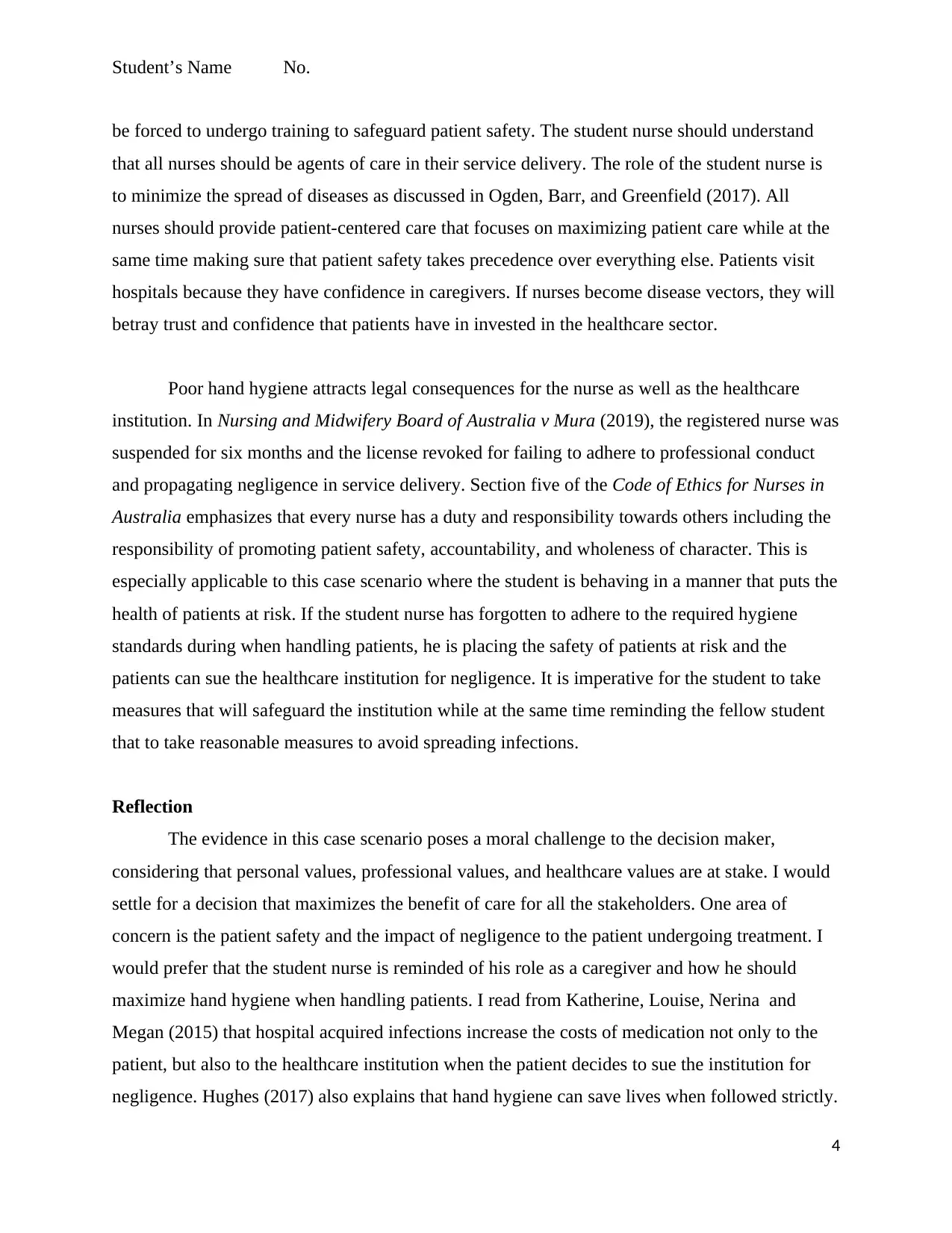
Student’s Name No.
be forced to undergo training to safeguard patient safety. The student nurse should understand
that all nurses should be agents of care in their service delivery. The role of the student nurse is
to minimize the spread of diseases as discussed in Ogden, Barr, and Greenfield (2017). All
nurses should provide patient-centered care that focuses on maximizing patient care while at the
same time making sure that patient safety takes precedence over everything else. Patients visit
hospitals because they have confidence in caregivers. If nurses become disease vectors, they will
betray trust and confidence that patients have in invested in the healthcare sector.
Poor hand hygiene attracts legal consequences for the nurse as well as the healthcare
institution. In Nursing and Midwifery Board of Australia v Mura (2019), the registered nurse was
suspended for six months and the license revoked for failing to adhere to professional conduct
and propagating negligence in service delivery. Section five of the Code of Ethics for Nurses in
Australia emphasizes that every nurse has a duty and responsibility towards others including the
responsibility of promoting patient safety, accountability, and wholeness of character. This is
especially applicable to this case scenario where the student is behaving in a manner that puts the
health of patients at risk. If the student nurse has forgotten to adhere to the required hygiene
standards during when handling patients, he is placing the safety of patients at risk and the
patients can sue the healthcare institution for negligence. It is imperative for the student to take
measures that will safeguard the institution while at the same time reminding the fellow student
that to take reasonable measures to avoid spreading infections.
Reflection
The evidence in this case scenario poses a moral challenge to the decision maker,
considering that personal values, professional values, and healthcare values are at stake. I would
settle for a decision that maximizes the benefit of care for all the stakeholders. One area of
concern is the patient safety and the impact of negligence to the patient undergoing treatment. I
would prefer that the student nurse is reminded of his role as a caregiver and how he should
maximize hand hygiene when handling patients. I read from Katherine, Louise, Nerina and
Megan (2015) that hospital acquired infections increase the costs of medication not only to the
patient, but also to the healthcare institution when the patient decides to sue the institution for
negligence. Hughes (2017) also explains that hand hygiene can save lives when followed strictly.
4
be forced to undergo training to safeguard patient safety. The student nurse should understand
that all nurses should be agents of care in their service delivery. The role of the student nurse is
to minimize the spread of diseases as discussed in Ogden, Barr, and Greenfield (2017). All
nurses should provide patient-centered care that focuses on maximizing patient care while at the
same time making sure that patient safety takes precedence over everything else. Patients visit
hospitals because they have confidence in caregivers. If nurses become disease vectors, they will
betray trust and confidence that patients have in invested in the healthcare sector.
Poor hand hygiene attracts legal consequences for the nurse as well as the healthcare
institution. In Nursing and Midwifery Board of Australia v Mura (2019), the registered nurse was
suspended for six months and the license revoked for failing to adhere to professional conduct
and propagating negligence in service delivery. Section five of the Code of Ethics for Nurses in
Australia emphasizes that every nurse has a duty and responsibility towards others including the
responsibility of promoting patient safety, accountability, and wholeness of character. This is
especially applicable to this case scenario where the student is behaving in a manner that puts the
health of patients at risk. If the student nurse has forgotten to adhere to the required hygiene
standards during when handling patients, he is placing the safety of patients at risk and the
patients can sue the healthcare institution for negligence. It is imperative for the student to take
measures that will safeguard the institution while at the same time reminding the fellow student
that to take reasonable measures to avoid spreading infections.
Reflection
The evidence in this case scenario poses a moral challenge to the decision maker,
considering that personal values, professional values, and healthcare values are at stake. I would
settle for a decision that maximizes the benefit of care for all the stakeholders. One area of
concern is the patient safety and the impact of negligence to the patient undergoing treatment. I
would prefer that the student nurse is reminded of his role as a caregiver and how he should
maximize hand hygiene when handling patients. I read from Katherine, Louise, Nerina and
Megan (2015) that hospital acquired infections increase the costs of medication not only to the
patient, but also to the healthcare institution when the patient decides to sue the institution for
negligence. Hughes (2017) also explains that hand hygiene can save lives when followed strictly.
4
Secure Best Marks with AI Grader
Need help grading? Try our AI Grader for instant feedback on your assignments.
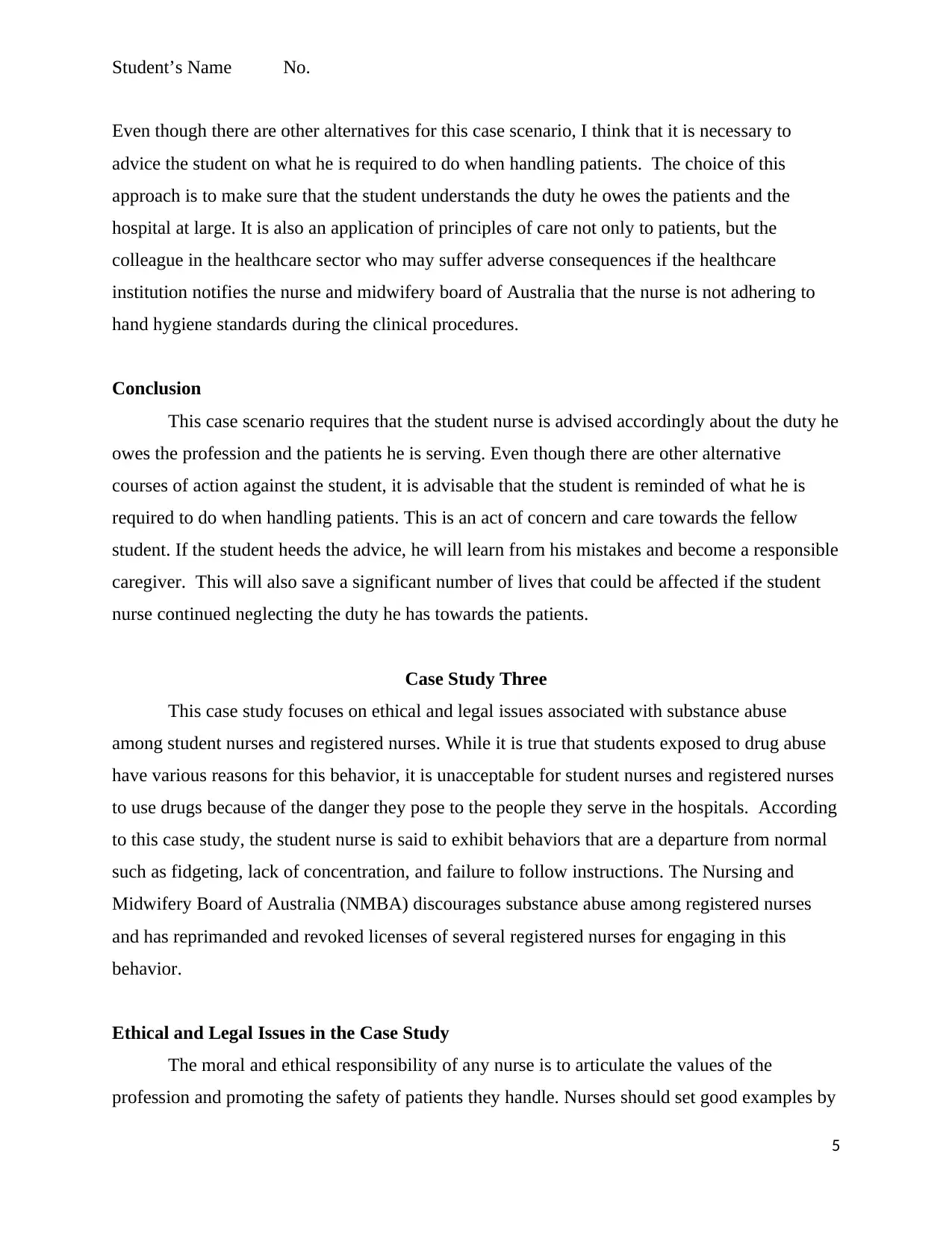
Student’s Name No.
Even though there are other alternatives for this case scenario, I think that it is necessary to
advice the student on what he is required to do when handling patients. The choice of this
approach is to make sure that the student understands the duty he owes the patients and the
hospital at large. It is also an application of principles of care not only to patients, but the
colleague in the healthcare sector who may suffer adverse consequences if the healthcare
institution notifies the nurse and midwifery board of Australia that the nurse is not adhering to
hand hygiene standards during the clinical procedures.
Conclusion
This case scenario requires that the student nurse is advised accordingly about the duty he
owes the profession and the patients he is serving. Even though there are other alternative
courses of action against the student, it is advisable that the student is reminded of what he is
required to do when handling patients. This is an act of concern and care towards the fellow
student. If the student heeds the advice, he will learn from his mistakes and become a responsible
caregiver. This will also save a significant number of lives that could be affected if the student
nurse continued neglecting the duty he has towards the patients.
Case Study Three
This case study focuses on ethical and legal issues associated with substance abuse
among student nurses and registered nurses. While it is true that students exposed to drug abuse
have various reasons for this behavior, it is unacceptable for student nurses and registered nurses
to use drugs because of the danger they pose to the people they serve in the hospitals. According
to this case study, the student nurse is said to exhibit behaviors that are a departure from normal
such as fidgeting, lack of concentration, and failure to follow instructions. The Nursing and
Midwifery Board of Australia (NMBA) discourages substance abuse among registered nurses
and has reprimanded and revoked licenses of several registered nurses for engaging in this
behavior.
Ethical and Legal Issues in the Case Study
The moral and ethical responsibility of any nurse is to articulate the values of the
profession and promoting the safety of patients they handle. Nurses should set good examples by
5
Even though there are other alternatives for this case scenario, I think that it is necessary to
advice the student on what he is required to do when handling patients. The choice of this
approach is to make sure that the student understands the duty he owes the patients and the
hospital at large. It is also an application of principles of care not only to patients, but the
colleague in the healthcare sector who may suffer adverse consequences if the healthcare
institution notifies the nurse and midwifery board of Australia that the nurse is not adhering to
hand hygiene standards during the clinical procedures.
Conclusion
This case scenario requires that the student nurse is advised accordingly about the duty he
owes the profession and the patients he is serving. Even though there are other alternative
courses of action against the student, it is advisable that the student is reminded of what he is
required to do when handling patients. This is an act of concern and care towards the fellow
student. If the student heeds the advice, he will learn from his mistakes and become a responsible
caregiver. This will also save a significant number of lives that could be affected if the student
nurse continued neglecting the duty he has towards the patients.
Case Study Three
This case study focuses on ethical and legal issues associated with substance abuse
among student nurses and registered nurses. While it is true that students exposed to drug abuse
have various reasons for this behavior, it is unacceptable for student nurses and registered nurses
to use drugs because of the danger they pose to the people they serve in the hospitals. According
to this case study, the student nurse is said to exhibit behaviors that are a departure from normal
such as fidgeting, lack of concentration, and failure to follow instructions. The Nursing and
Midwifery Board of Australia (NMBA) discourages substance abuse among registered nurses
and has reprimanded and revoked licenses of several registered nurses for engaging in this
behavior.
Ethical and Legal Issues in the Case Study
The moral and ethical responsibility of any nurse is to articulate the values of the
profession and promoting the safety of patients they handle. Nurses should set good examples by
5
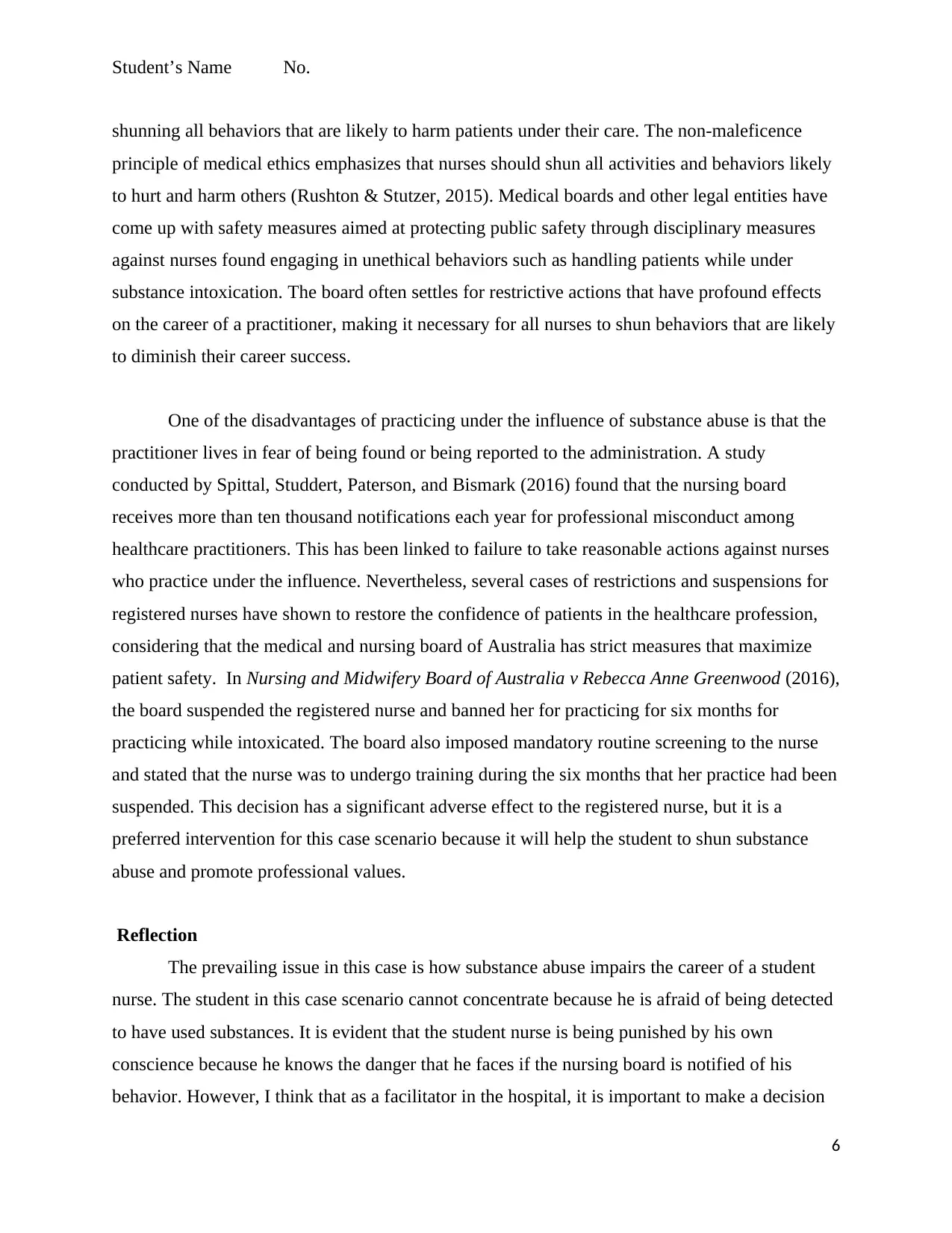
Student’s Name No.
shunning all behaviors that are likely to harm patients under their care. The non-maleficence
principle of medical ethics emphasizes that nurses should shun all activities and behaviors likely
to hurt and harm others (Rushton & Stutzer, 2015). Medical boards and other legal entities have
come up with safety measures aimed at protecting public safety through disciplinary measures
against nurses found engaging in unethical behaviors such as handling patients while under
substance intoxication. The board often settles for restrictive actions that have profound effects
on the career of a practitioner, making it necessary for all nurses to shun behaviors that are likely
to diminish their career success.
One of the disadvantages of practicing under the influence of substance abuse is that the
practitioner lives in fear of being found or being reported to the administration. A study
conducted by Spittal, Studdert, Paterson, and Bismark (2016) found that the nursing board
receives more than ten thousand notifications each year for professional misconduct among
healthcare practitioners. This has been linked to failure to take reasonable actions against nurses
who practice under the influence. Nevertheless, several cases of restrictions and suspensions for
registered nurses have shown to restore the confidence of patients in the healthcare profession,
considering that the medical and nursing board of Australia has strict measures that maximize
patient safety. In Nursing and Midwifery Board of Australia v Rebecca Anne Greenwood (2016),
the board suspended the registered nurse and banned her for practicing for six months for
practicing while intoxicated. The board also imposed mandatory routine screening to the nurse
and stated that the nurse was to undergo training during the six months that her practice had been
suspended. This decision has a significant adverse effect to the registered nurse, but it is a
preferred intervention for this case scenario because it will help the student to shun substance
abuse and promote professional values.
Reflection
The prevailing issue in this case is how substance abuse impairs the career of a student
nurse. The student in this case scenario cannot concentrate because he is afraid of being detected
to have used substances. It is evident that the student nurse is being punished by his own
conscience because he knows the danger that he faces if the nursing board is notified of his
behavior. However, I think that as a facilitator in the hospital, it is important to make a decision
6
shunning all behaviors that are likely to harm patients under their care. The non-maleficence
principle of medical ethics emphasizes that nurses should shun all activities and behaviors likely
to hurt and harm others (Rushton & Stutzer, 2015). Medical boards and other legal entities have
come up with safety measures aimed at protecting public safety through disciplinary measures
against nurses found engaging in unethical behaviors such as handling patients while under
substance intoxication. The board often settles for restrictive actions that have profound effects
on the career of a practitioner, making it necessary for all nurses to shun behaviors that are likely
to diminish their career success.
One of the disadvantages of practicing under the influence of substance abuse is that the
practitioner lives in fear of being found or being reported to the administration. A study
conducted by Spittal, Studdert, Paterson, and Bismark (2016) found that the nursing board
receives more than ten thousand notifications each year for professional misconduct among
healthcare practitioners. This has been linked to failure to take reasonable actions against nurses
who practice under the influence. Nevertheless, several cases of restrictions and suspensions for
registered nurses have shown to restore the confidence of patients in the healthcare profession,
considering that the medical and nursing board of Australia has strict measures that maximize
patient safety. In Nursing and Midwifery Board of Australia v Rebecca Anne Greenwood (2016),
the board suspended the registered nurse and banned her for practicing for six months for
practicing while intoxicated. The board also imposed mandatory routine screening to the nurse
and stated that the nurse was to undergo training during the six months that her practice had been
suspended. This decision has a significant adverse effect to the registered nurse, but it is a
preferred intervention for this case scenario because it will help the student to shun substance
abuse and promote professional values.
Reflection
The prevailing issue in this case is how substance abuse impairs the career of a student
nurse. The student in this case scenario cannot concentrate because he is afraid of being detected
to have used substances. It is evident that the student nurse is being punished by his own
conscience because he knows the danger that he faces if the nursing board is notified of his
behavior. However, I think that as a facilitator in the hospital, it is important to make a decision
6
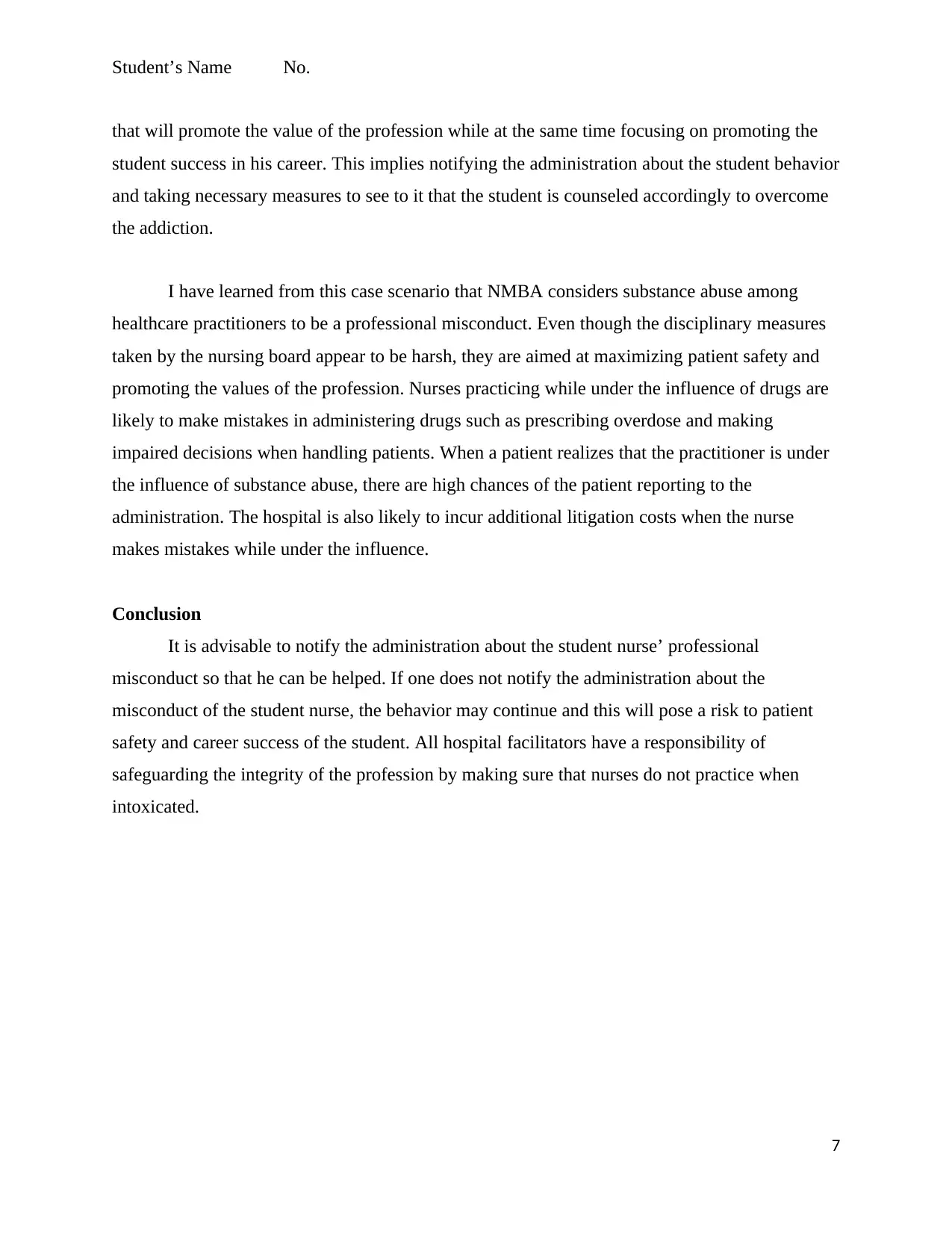
Student’s Name No.
that will promote the value of the profession while at the same time focusing on promoting the
student success in his career. This implies notifying the administration about the student behavior
and taking necessary measures to see to it that the student is counseled accordingly to overcome
the addiction.
I have learned from this case scenario that NMBA considers substance abuse among
healthcare practitioners to be a professional misconduct. Even though the disciplinary measures
taken by the nursing board appear to be harsh, they are aimed at maximizing patient safety and
promoting the values of the profession. Nurses practicing while under the influence of drugs are
likely to make mistakes in administering drugs such as prescribing overdose and making
impaired decisions when handling patients. When a patient realizes that the practitioner is under
the influence of substance abuse, there are high chances of the patient reporting to the
administration. The hospital is also likely to incur additional litigation costs when the nurse
makes mistakes while under the influence.
Conclusion
It is advisable to notify the administration about the student nurse’ professional
misconduct so that he can be helped. If one does not notify the administration about the
misconduct of the student nurse, the behavior may continue and this will pose a risk to patient
safety and career success of the student. All hospital facilitators have a responsibility of
safeguarding the integrity of the profession by making sure that nurses do not practice when
intoxicated.
7
that will promote the value of the profession while at the same time focusing on promoting the
student success in his career. This implies notifying the administration about the student behavior
and taking necessary measures to see to it that the student is counseled accordingly to overcome
the addiction.
I have learned from this case scenario that NMBA considers substance abuse among
healthcare practitioners to be a professional misconduct. Even though the disciplinary measures
taken by the nursing board appear to be harsh, they are aimed at maximizing patient safety and
promoting the values of the profession. Nurses practicing while under the influence of drugs are
likely to make mistakes in administering drugs such as prescribing overdose and making
impaired decisions when handling patients. When a patient realizes that the practitioner is under
the influence of substance abuse, there are high chances of the patient reporting to the
administration. The hospital is also likely to incur additional litigation costs when the nurse
makes mistakes while under the influence.
Conclusion
It is advisable to notify the administration about the student nurse’ professional
misconduct so that he can be helped. If one does not notify the administration about the
misconduct of the student nurse, the behavior may continue and this will pose a risk to patient
safety and career success of the student. All hospital facilitators have a responsibility of
safeguarding the integrity of the profession by making sure that nurses do not practice when
intoxicated.
7
Paraphrase This Document
Need a fresh take? Get an instant paraphrase of this document with our AI Paraphraser
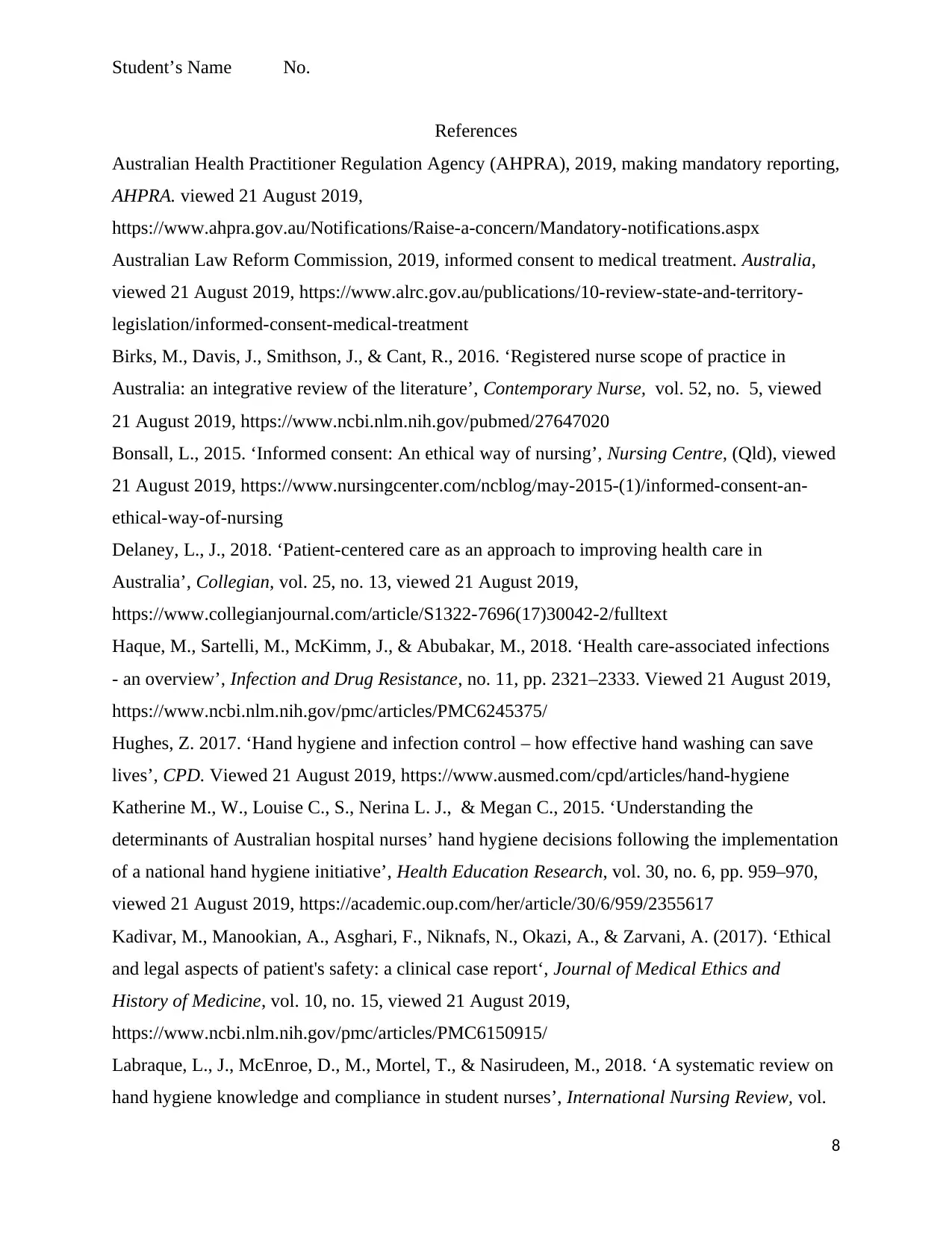
Student’s Name No.
References
Australian Health Practitioner Regulation Agency (AHPRA), 2019, making mandatory reporting,
AHPRA. viewed 21 August 2019,
https://www.ahpra.gov.au/Notifications/Raise-a-concern/Mandatory-notifications.aspx
Australian Law Reform Commission, 2019, informed consent to medical treatment. Australia,
viewed 21 August 2019, https://www.alrc.gov.au/publications/10-review-state-and-territory-
legislation/informed-consent-medical-treatment
Birks, M., Davis, J., Smithson, J., & Cant, R., 2016. ‘Registered nurse scope of practice in
Australia: an integrative review of the literature’, Contemporary Nurse, vol. 52, no. 5, viewed
21 August 2019, https://www.ncbi.nlm.nih.gov/pubmed/27647020
Bonsall, L., 2015. ‘Informed consent: An ethical way of nursing’, Nursing Centre, (Qld), viewed
21 August 2019, https://www.nursingcenter.com/ncblog/may-2015-(1)/informed-consent-an-
ethical-way-of-nursing
Delaney, L., J., 2018. ‘Patient-centered care as an approach to improving health care in
Australia’, Collegian, vol. 25, no. 13, viewed 21 August 2019,
https://www.collegianjournal.com/article/S1322-7696(17)30042-2/fulltext
Haque, M., Sartelli, M., McKimm, J., & Abubakar, M., 2018. ‘Health care-associated infections
- an overview’, Infection and Drug Resistance, no. 11, pp. 2321–2333. Viewed 21 August 2019,
https://www.ncbi.nlm.nih.gov/pmc/articles/PMC6245375/
Hughes, Z. 2017. ‘Hand hygiene and infection control – how effective hand washing can save
lives’, CPD. Viewed 21 August 2019, https://www.ausmed.com/cpd/articles/hand-hygiene
Katherine M., W., Louise C., S., Nerina L. J., & Megan C., 2015. ‘Understanding the
determinants of Australian hospital nurses’ hand hygiene decisions following the implementation
of a national hand hygiene initiative’, Health Education Research, vol. 30, no. 6, pp. 959–970,
viewed 21 August 2019, https://academic.oup.com/her/article/30/6/959/2355617
Kadivar, M., Manookian, A., Asghari, F., Niknafs, N., Okazi, A., & Zarvani, A. (2017). ‘Ethical
and legal aspects of patient's safety: a clinical case report‘, Journal of Medical Ethics and
History of Medicine, vol. 10, no. 15, viewed 21 August 2019,
https://www.ncbi.nlm.nih.gov/pmc/articles/PMC6150915/
Labraque, L., J., McEnroe, D., M., Mortel, T., & Nasirudeen, M., 2018. ‘A systematic review on
hand hygiene knowledge and compliance in student nurses’, International Nursing Review, vol.
8
References
Australian Health Practitioner Regulation Agency (AHPRA), 2019, making mandatory reporting,
AHPRA. viewed 21 August 2019,
https://www.ahpra.gov.au/Notifications/Raise-a-concern/Mandatory-notifications.aspx
Australian Law Reform Commission, 2019, informed consent to medical treatment. Australia,
viewed 21 August 2019, https://www.alrc.gov.au/publications/10-review-state-and-territory-
legislation/informed-consent-medical-treatment
Birks, M., Davis, J., Smithson, J., & Cant, R., 2016. ‘Registered nurse scope of practice in
Australia: an integrative review of the literature’, Contemporary Nurse, vol. 52, no. 5, viewed
21 August 2019, https://www.ncbi.nlm.nih.gov/pubmed/27647020
Bonsall, L., 2015. ‘Informed consent: An ethical way of nursing’, Nursing Centre, (Qld), viewed
21 August 2019, https://www.nursingcenter.com/ncblog/may-2015-(1)/informed-consent-an-
ethical-way-of-nursing
Delaney, L., J., 2018. ‘Patient-centered care as an approach to improving health care in
Australia’, Collegian, vol. 25, no. 13, viewed 21 August 2019,
https://www.collegianjournal.com/article/S1322-7696(17)30042-2/fulltext
Haque, M., Sartelli, M., McKimm, J., & Abubakar, M., 2018. ‘Health care-associated infections
- an overview’, Infection and Drug Resistance, no. 11, pp. 2321–2333. Viewed 21 August 2019,
https://www.ncbi.nlm.nih.gov/pmc/articles/PMC6245375/
Hughes, Z. 2017. ‘Hand hygiene and infection control – how effective hand washing can save
lives’, CPD. Viewed 21 August 2019, https://www.ausmed.com/cpd/articles/hand-hygiene
Katherine M., W., Louise C., S., Nerina L. J., & Megan C., 2015. ‘Understanding the
determinants of Australian hospital nurses’ hand hygiene decisions following the implementation
of a national hand hygiene initiative’, Health Education Research, vol. 30, no. 6, pp. 959–970,
viewed 21 August 2019, https://academic.oup.com/her/article/30/6/959/2355617
Kadivar, M., Manookian, A., Asghari, F., Niknafs, N., Okazi, A., & Zarvani, A. (2017). ‘Ethical
and legal aspects of patient's safety: a clinical case report‘, Journal of Medical Ethics and
History of Medicine, vol. 10, no. 15, viewed 21 August 2019,
https://www.ncbi.nlm.nih.gov/pmc/articles/PMC6150915/
Labraque, L., J., McEnroe, D., M., Mortel, T., & Nasirudeen, M., 2018. ‘A systematic review on
hand hygiene knowledge and compliance in student nurses’, International Nursing Review, vol.
8
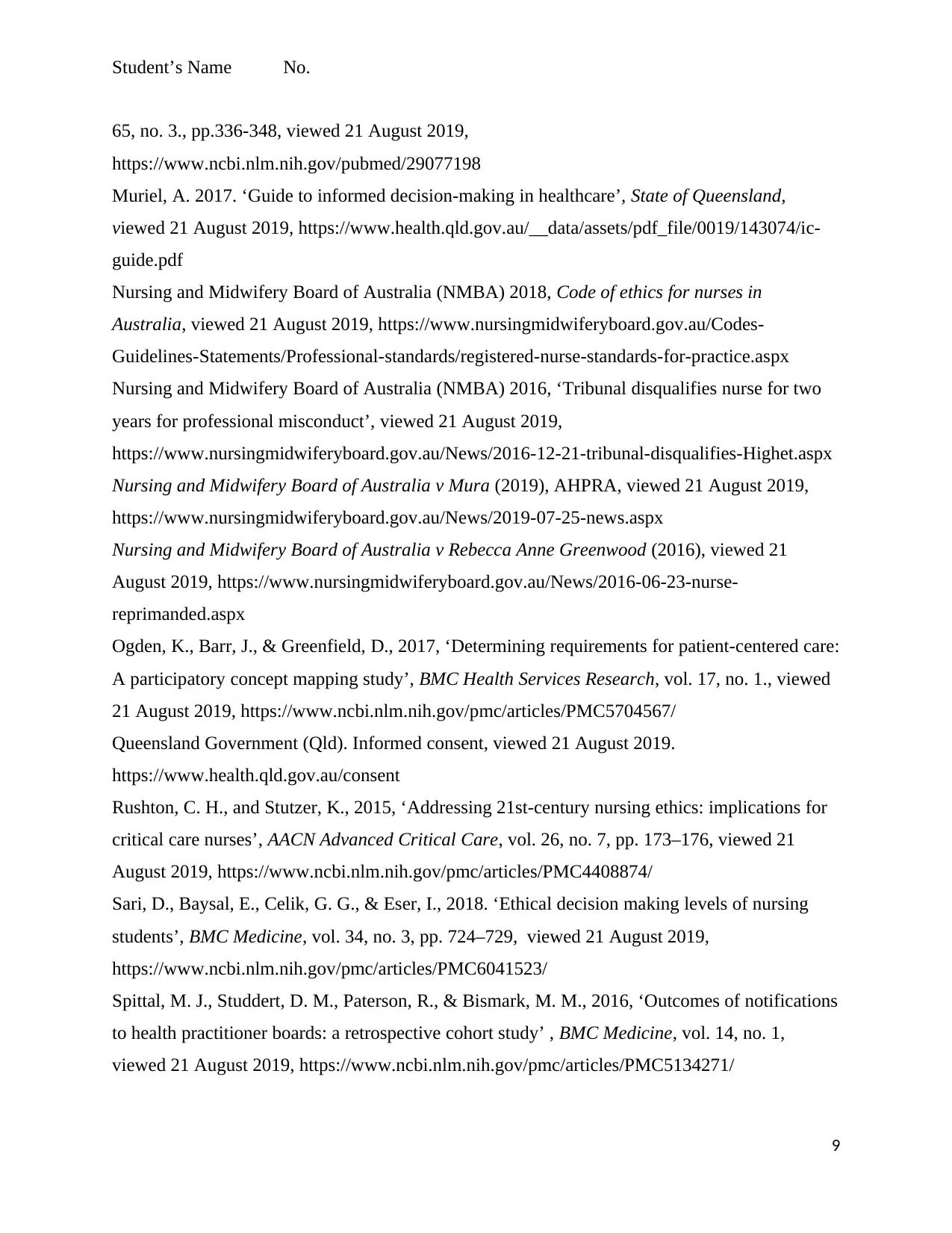
Student’s Name No.
65, no. 3., pp.336-348, viewed 21 August 2019,
https://www.ncbi.nlm.nih.gov/pubmed/29077198
Muriel, A. 2017. ‘Guide to informed decision-making in healthcare’, State of Queensland,
viewed 21 August 2019, https://www.health.qld.gov.au/__data/assets/pdf_file/0019/143074/ic-
guide.pdf
Nursing and Midwifery Board of Australia (NMBA) 2018, Code of ethics for nurses in
Australia, viewed 21 August 2019, https://www.nursingmidwiferyboard.gov.au/Codes-
Guidelines-Statements/Professional-standards/registered-nurse-standards-for-practice.aspx
Nursing and Midwifery Board of Australia (NMBA) 2016, ‘Tribunal disqualifies nurse for two
years for professional misconduct’, viewed 21 August 2019,
https://www.nursingmidwiferyboard.gov.au/News/2016-12-21-tribunal-disqualifies-Highet.aspx
Nursing and Midwifery Board of Australia v Mura (2019), AHPRA, viewed 21 August 2019,
https://www.nursingmidwiferyboard.gov.au/News/2019-07-25-news.aspx
Nursing and Midwifery Board of Australia v Rebecca Anne Greenwood (2016), viewed 21
August 2019, https://www.nursingmidwiferyboard.gov.au/News/2016-06-23-nurse-
reprimanded.aspx
Ogden, K., Barr, J., & Greenfield, D., 2017, ‘Determining requirements for patient-centered care:
A participatory concept mapping study’, BMC Health Services Research, vol. 17, no. 1., viewed
21 August 2019, https://www.ncbi.nlm.nih.gov/pmc/articles/PMC5704567/
Queensland Government (Qld). Informed consent, viewed 21 August 2019.
https://www.health.qld.gov.au/consent
Rushton, C. H., and Stutzer, K., 2015, ‘Addressing 21st-century nursing ethics: implications for
critical care nurses’, AACN Advanced Critical Care, vol. 26, no. 7, pp. 173–176, viewed 21
August 2019, https://www.ncbi.nlm.nih.gov/pmc/articles/PMC4408874/
Sari, D., Baysal, E., Celik, G. G., & Eser, I., 2018. ‘Ethical decision making levels of nursing
students’, BMC Medicine, vol. 34, no. 3, pp. 724–729, viewed 21 August 2019,
https://www.ncbi.nlm.nih.gov/pmc/articles/PMC6041523/
Spittal, M. J., Studdert, D. M., Paterson, R., & Bismark, M. M., 2016, ‘Outcomes of notifications
to health practitioner boards: a retrospective cohort study’ , BMC Medicine, vol. 14, no. 1,
viewed 21 August 2019, https://www.ncbi.nlm.nih.gov/pmc/articles/PMC5134271/
9
65, no. 3., pp.336-348, viewed 21 August 2019,
https://www.ncbi.nlm.nih.gov/pubmed/29077198
Muriel, A. 2017. ‘Guide to informed decision-making in healthcare’, State of Queensland,
viewed 21 August 2019, https://www.health.qld.gov.au/__data/assets/pdf_file/0019/143074/ic-
guide.pdf
Nursing and Midwifery Board of Australia (NMBA) 2018, Code of ethics for nurses in
Australia, viewed 21 August 2019, https://www.nursingmidwiferyboard.gov.au/Codes-
Guidelines-Statements/Professional-standards/registered-nurse-standards-for-practice.aspx
Nursing and Midwifery Board of Australia (NMBA) 2016, ‘Tribunal disqualifies nurse for two
years for professional misconduct’, viewed 21 August 2019,
https://www.nursingmidwiferyboard.gov.au/News/2016-12-21-tribunal-disqualifies-Highet.aspx
Nursing and Midwifery Board of Australia v Mura (2019), AHPRA, viewed 21 August 2019,
https://www.nursingmidwiferyboard.gov.au/News/2019-07-25-news.aspx
Nursing and Midwifery Board of Australia v Rebecca Anne Greenwood (2016), viewed 21
August 2019, https://www.nursingmidwiferyboard.gov.au/News/2016-06-23-nurse-
reprimanded.aspx
Ogden, K., Barr, J., & Greenfield, D., 2017, ‘Determining requirements for patient-centered care:
A participatory concept mapping study’, BMC Health Services Research, vol. 17, no. 1., viewed
21 August 2019, https://www.ncbi.nlm.nih.gov/pmc/articles/PMC5704567/
Queensland Government (Qld). Informed consent, viewed 21 August 2019.
https://www.health.qld.gov.au/consent
Rushton, C. H., and Stutzer, K., 2015, ‘Addressing 21st-century nursing ethics: implications for
critical care nurses’, AACN Advanced Critical Care, vol. 26, no. 7, pp. 173–176, viewed 21
August 2019, https://www.ncbi.nlm.nih.gov/pmc/articles/PMC4408874/
Sari, D., Baysal, E., Celik, G. G., & Eser, I., 2018. ‘Ethical decision making levels of nursing
students’, BMC Medicine, vol. 34, no. 3, pp. 724–729, viewed 21 August 2019,
https://www.ncbi.nlm.nih.gov/pmc/articles/PMC6041523/
Spittal, M. J., Studdert, D. M., Paterson, R., & Bismark, M. M., 2016, ‘Outcomes of notifications
to health practitioner boards: a retrospective cohort study’ , BMC Medicine, vol. 14, no. 1,
viewed 21 August 2019, https://www.ncbi.nlm.nih.gov/pmc/articles/PMC5134271/
9
1 out of 9
Related Documents
Your All-in-One AI-Powered Toolkit for Academic Success.
+13062052269
info@desklib.com
Available 24*7 on WhatsApp / Email
![[object Object]](/_next/static/media/star-bottom.7253800d.svg)
Unlock your academic potential
© 2024 | Zucol Services PVT LTD | All rights reserved.





